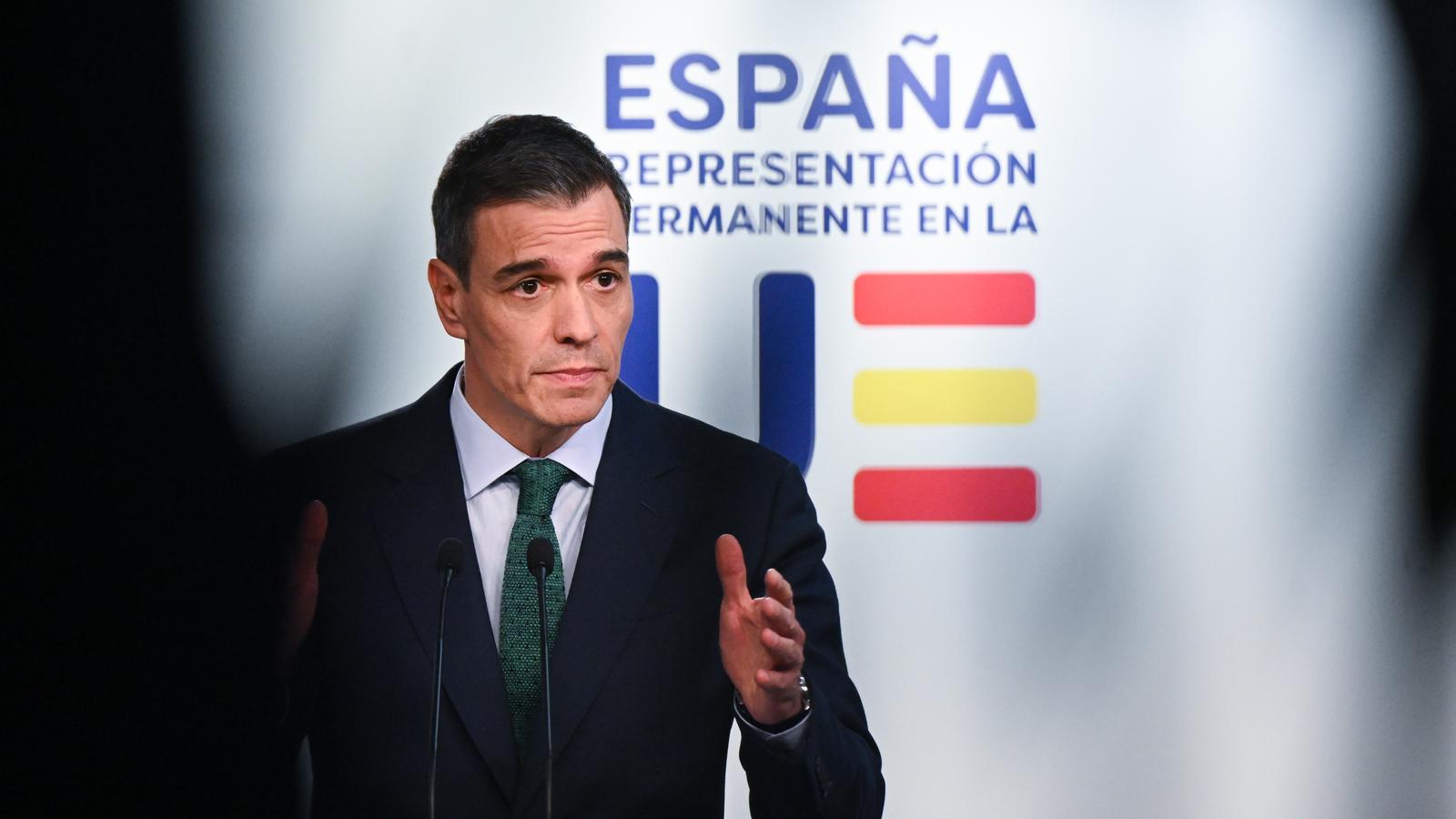BrusselsSpain, along with Ireland, was the first country to formally request a review of the European Union's association agreement with Israel. It has been one of the member states seeking the most sanctions against Benjamin Netanyahu's government, and, especially since the start of the Gaza war, has emerged as one of the European club's most vocal voices against Tel Aviv. The battery of restrictions on Israel announced this Monday by Pedro Sánchez This is confirmed by the fact that he openly calls the Gaza war a "genocide." However, his demands have often come to nothing in the corridors of Brussels, and the EU has only applied very timid measures of pressure on the Israeli executive.
At this point, the European Union has applied almost no punishment whatsoever against the Netanyahu government and has only frozen a portion of the European Horizon funds, which finance scientific research and innovation projects, and from which Israel also benefits. Finally, it also decided to add personalities and entities belonging to the violent settlers in the West Bank to the blacklist.
However, Ursula von der Leyen delivered a harsher than usual speech against Israel this Wednesday and announced that she will propose a battery of sanctions. Specifically, it will include restrictions on violent settlers in the West Bank and the "most radical" Israeli ministers, and a "partial suspension" of the association agreement with Israel, as Spain has long demanded. In fact, the Spanish government has been quick to take credit for it.
"Thanks to Spain's leadership and influence in the EU in defense of civilians, these measures are beginning to be on the table," celebrated Spanish Foreign Minister José Manuel Albares. Thus, despite the fact that the Moncloa supports "the total suspension of the association agreement," it "welcomes the partial suspension" and makes public its "full support" for Von der Leyen with the sanctions she announced this Wednesday in the European Parliament.
Now then, The EU still maintains the association agreement with Israel, to whom it gives priority in political dialogue and trade relations. Thus, it did not break or freeze this pact despite the European Commission's investigation, which noted "indications" that the Israeli army was violating human rights in Gaza, which violated one of the conditions of the agreement itself. In fact, the EU reviewed the pact—as Spain unsuccessfully requested—at the request of the Netherlands, and a qualified majority of countries joined, but the vast majority only saw it as an act of pressure on Netanyahu and had no real intention of ultimately sanctioning him. Furthermore, partially suspending the association agreement requires the approval of the member states, who remain divided and are expected to be very difficult to reach a consensus to punish Netanyahu.
However, since the Hamas attack on October 7, 2023, the European Union has increasingly moved closer to pro-Palestinian positions, such as that of the Sánchez government. Although so far the blog has only applied minimal restrictions. As for each European country individually, more and more state governments are recognizing the Palestinian state. Last year, Spain, Slovenia, Ireland, and Norway (which is not in the EU) took the step. France, Malta, and Belgium will also recognize it this year; and Portugal, Finland, Luxembourg, and, outside the EU, the United Kingdom are considering it.
States such as Slovenia, the Netherlands, and Belgium have also applied individual sanctions against members of Netanyahu's government, and have applied restrictions to violent settlers in the West Bank or even declared Israeli ministers persons non grataAs for Germany, which is one of the most pro-Israel countries in the EU and always stalls on sanctions, it is also showing signs of fatigue with Tel Aviv.
Borrell and Ribera, the most pro-Palestinian leaders
Both Josep Borrell, when he headed European diplomacy in the previous term, and Teresa Ribera, as First Vice-President of the European Commission, were great counterweights to the most pro-Israeli leaders. Among those closest to Tel Aviv are the President of the European Commission, the German conservative Ursula von der Leyen, and the President of the European Parliament, the conservative Roberta Metsola. In this regard, the Catalan leader left office proposing breaking the EU's association agreement with Israel, and Ribera last week broke the EU-consensus script and called the Gaza war a "genocide," a word whose superior, Von der Leyen, always avoids using.
The United Kingdom sees no "genocidal intent" in the Gaza war.
Former Foreign Office chief David Lammy made it clear in a recent letter that the British government does not believe Israel is acting with "genocidal intent" in Gaza. This legal and political distinction allows London to maintain arms export licenses to Tel Aviv, although it has restricted some of them. The Foreign Office's position is that it is not for the executive branch to determine whether Israel is committing genocide, but rather for international courts to determine whether it is committed. The only assessment is whether there is a serious risk of genocidal intent. According to the latest analysis compiled by Lammy, who led the Foreign Office before last Friday's government reshuffle, the conclusion was negative, which supports continued arms shipments.
In this context, Israeli President Isaac Herzog arrived in London on Tuesday. Despite criticism from some MPs, he will finally be received in Downing Street by Prime Minister Keir Starmer, and not just by the new Foreign Secretary, Yvette Cooper, as initially planned. The meeting with Herzog will take place hours after Starmer met with Palestinian Authority President Mahmoud Abbas on Monday evening.
The British government maintains that Herzog is a symbolic figure and is not directly involved in the military offensive, although his statements have sparked controversy. Officially, the purpose of the trip is to show support for the British Jewish community in the face of rising anti-Semitism. However, the meeting with the prime minister will also take place amid the debate over the recognition of Palestine as a state, a decision that London could announce at the United Nations at the end of the month.


